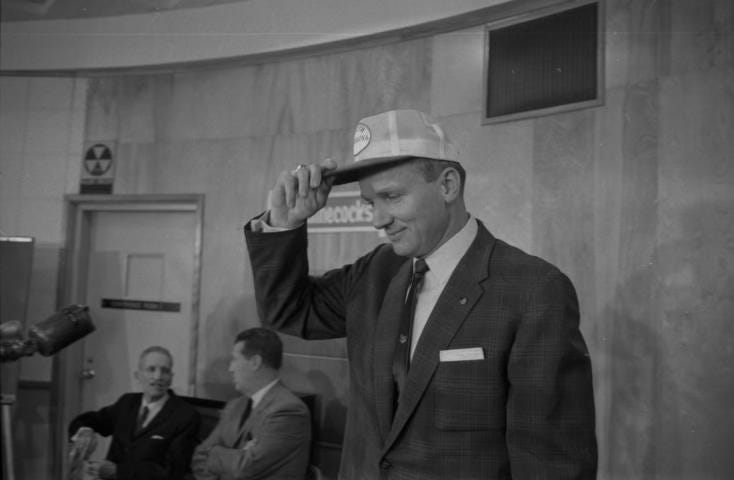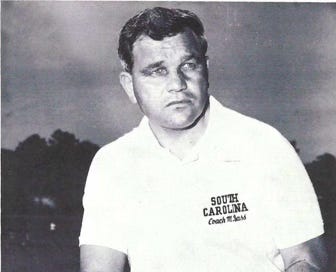Part Two: The Gamecocks' forgotten Atlantic Coast Conference title of 1965
How controversial sanctions and a forfeited title marked the first step toward Carolina's eventual ACC exit
(Author’s note: this article is part 2 of a three-part series. Part one can be accessed here)
Marvin Bass was a bear of a man. Or perhaps a “Moose,” his lovingly-bestowed nickname. He was brawny, with a ruddy complexion, storm-tossed waves of dark hair, and hands the size of dinner plates. The Norfolk, Virginia native bore the scars of a lifetime of football - gnarled knuckles and battle-weary knees.
He had been an honorable mention All-America playing tackle at William and Mary, captaining the 1942 squad. Drafted by the NFL’s Detroit Lions, Bass never played professional football, serving instead in the US Navy from 1943 until 1945.
Upon discharge from the Navy, Bass began his coaching career, first at William and Mary, then North Carolina, before a one-year stint with the Washington Redskins in 1953. He returned to Chapel Hill, serving as an assistant from 1954 through 1956. During those years Bass befriended then Tar Heel head basketball coach Frank McGuire - a relationship that would prove pivotal in luring McGuire to South Carolina years later.
Bass made his first stop at South Carolina following the ‘56 season as an assistant under Warren Giese. After a one-year detour to Atlanta in 1960, where he served on Bobby Dodd’s Georgia Tech staff, Bass returned to South Carolina, this time as head coach following the resignation of Geise after the 1960 season. The big Virginian took on the additional responsibilities of athletics director upon the retirement of Rex Enright in 1962.
Now, after five seasons with the Gamecocks, “Moose” was moving on once more.
“I hate to leave Columbia and the State of South Carolina because I feel that I have many friends there,” Bass said in March of 1966 after announcing his resignation as Gamecock coach, “but this was too good an offer for me to turn down. It is the best offer I’ve ever had in coaching,” Bass noted of his new role as general manager and head coach of the Continental Football League’s new Montreal franchise.
Bass accumulated a 17-29-4 record as Gamecock head coach between 1961 and 1965. He never enjoyed a winning season at Carolina - his best record, the 5-5 finish in 1965. Despite some high points, including a share of the ‘65 ACC title and winning three of five against Clemson, the board of trustees would not extend Bass’s contract beyond a year-to-year agreement.
Speaking with Alex Riley of The State in a 2009 article about the 1965 team, Bass cited that short-term contract arrangement as a reason for leaving in 1966. “I knew I couldn’t recruit very successfully just having one year on my contract, and they wouldn’t have fired me here, I’m convinced of that,” Bass said. “But I told them when I left that meeting with them (following the ‘65 season), if I don’t get an extension on my contract, the first job that comes along, I’m taking it.”
Indeed, Bass was tremendously popular within the University community, and probably wouldn’t have been fired, despite his losing record. “Anyone who knows Marvin Bass has affection for him,” The State’s Herman Helms wrote of Bass. “He is an individual of the best quality. Anyone who knows him has to feel a sense of loss now that he’s leaving the University of South Carolina.”
The search to fill Football, Athletics Director openings
Before departing for Montreal, Bass recommended Frank McGuire for the athletics director job, noting that McGuire would be the “logical man for the job.”
Perhaps inspired by Bass’s endorsement, a group of citizens wrote an open letter to University President Thomas Jones recommending Coach McGuire for the open AD position.
“No coach in years has brought our school or state more national recognition than Coach McGuire. As Athletic Director, Coach McGuire would be in an even better position to give our University and state the kind of public relations we sorely need.”
“ We also feel that no one is better qualified to assist in obtaining a top-flight football coach than Coach McGuire. With all of the problems now facing the Athletic Department, the University of South Carolina cannot afford to lose a man of such leadership and talent.”
The letter was signed by a who’s-who of local and university-affiliated luminaries, the likes of John Terry, president of the Columbia Touchdown Club, Charles Myers, president of the Columbia Tip-off Club, the entire membership of the University’s Lettermen’s Club, radio “Voice of the Gamecocks,” Bob Fulton, alumnus and benefactor Dr. Charles Crews, Gamecock historian Don Barton, booster Jeff Hunt (who had been integral in connecting McGuire with USC officials in 1964), football great Johnny Gramling, and basketball legend Grady Wallace.
As is typical of coaching and administrative vacancies, rumors about Bass’s replacement swirled in local media. “Mysterious Murray Trip Unproductive?” one headline of a Herman Helms column read in The State on April 1. Former Duke coach Bill Murray had been spotted by two writers from the Columbia paper leaving the residence of USC President Tom Jones on campus.
(one imagines the intrepid reporters in trench coats and fedoras, comically peeking out from a crouch behind blooming azaleas, or perhaps sitting on benches at the Horseshoe, conspicuously obscured behind spread newspapers)
Murray, had resigned a year earlier after a highly-successful 15-year stint in Durham, and was then the executive secretary of the American Football Coach’s Association. Both men denied the visit was to discuss the open coaching position, with Jones describing it as advisory in nature.
Dietzel enters the picture
By April 2, reports confirmed USC officials would meet with Army head coach Paul Dietzel. From Fremont, Ohio, near the shores of Lake Erie, Dietzel played college ball for a season at Duke, then served in the Army Air Corps during World War II, before returning to college at Miami of Ohio. Upon graduation, he was drafted in the late rounds by the Chicago Bears, but like Bass, never played professional football. Instead, he entered coaching, where he honed his craft between 1948 and 1954 with assistant coaching stops at Cincinnati and Kentucky, bookended by two stints at Army.
Dietzel earned his first head coaching opportunity at Louisiana State, where he served from 1955 through 1961, famously winning the national championship in 1958. A four year stop in the familiar territory of West Point followed.
By 1966 when South Carolina came calling, Dietzel, though not ready to surrender his coaches’ whistle quite yet, was eager for an opportunity to move into administration.
During a reported four-hour meeting at the International Hotel in New York’s Kennedy Airport on Sunday, April 3, USC President Jones and Dr. James A. Morris, faculty athletic chairman and acting athletic director, met with Dietzel and his chief assistant coach, George Terry.

The most significant part about the meeting, according to The State’s Executive News Editor, Charles H. Wickenburg, did not lie in the intricacies of the negotiations or in the final decision itself. The real story lay in the two men who did the talking on behalf of the University.
In the past it had been members of the University Board of Trustees Athletic Committee which had handled such high-level negotiations. Just two years prior when USC courted McGuire, the coach was perplexed when an interview was scheduled, not to Columbia, but “down the country,” in Barnwell, where he met with Athletic Committee Chairman Sol Blatt, Jr. and his father, Speaker Emeritus of the South Carolina House, Sol Blatt, Sr.
The deep involvement of one of the state’s most powerful political families had complicated USC’s athletic administration for years.
“There is no doubt the roles assumed were well-intended and genuinely sought to be helpful,” Wickenburg wrote. However, “In the wake of the resignation of Football Coach an Athletic Director Marvin Bass and the search for a successor, the University Board of Trustees last week had a full discussion of the control of the athletic program.”
Wickenburg quoted Board Chairman Rutledge I. Osborne, whose comments, while somewhat vague, indicated a power shift from the board’s athletic committee to the university president. Osborne noted, “…the feeling was unanimous. We are headed in the right direction.”
Indeed, the responsibility for negotiating on behalf of the University would now rest with President Jones, while the board’s athletic committee would act in an advisory capacity only. “There is no way in the world of placing responsibility without placing authority,” Osborne added.
Another unnamed trustee confirmed, “We are going in the right direction,” adding perhaps with some naiveté, “The old system will not work its way back again.”
The “old system” would not die quite so easily. The Blatts continued to wield outsized influence in athletic affairs well into the 1970s, putting their collective thumb on the scale in power squabbles between McGuire and Dietzel’s future replacement, Jim Carlen.
But that is a story for another time.
On April 6, 1966, Dietzel signed a ten-year contract with the University of South Carolina to become its athletic director and head football coach. Financials were not disclosed other than Dietzel’s comment that his move was not about money. “I was not underpaid at West Point,” he wryly noted.
Introduced to gathered press as “the man who is going to lead the Gamecocks to a new era of athletics,” Dietzel gave off a confident, relaxed vibe as he took the podium at USC’s Roundhouse Athletics offices.
“I hope I’m able to fulfill the faith the University of South Carolina has shown in me,” the 41-year-old Dietzel said. Dietzel praised his “old, warm friend,” Frank McGuire, noting, “If I, as Director of Athletics, had to go across the nation searching for a basketball coach, I know I could never come up with a better man.”
And then, as if placing the Blatts and their “old system” on notice, Dietzel noted,
“My entire dedication is to this university and President Thomas F. Jones. I’ve worked in a state capitol with a state university before, and I’ve learned that politicians are wonderful people. Those who aren’t don’t remain politicians very long. But I don’t intend to tell them how to run their business.”
The implication was clear. Dietzel would answer to Jones, and Jones alone.
The new coach outlined a “three-part plan” that he and Jones had established as a guide to this new era of Gamecock athletics. First, everything would be done by the rules. Second, Dietzel and Jones both wanted a winner. Third, the athletic department would operate in the black.
The first point addressed a brewing controversy that became a focal point of Dietzel’s first months at USC.
Next: The third and final part of this series - ACC commissioner reveals results of the investigation into improprieties surrounding USC’s 1965 football team, and outlines resulting punishment.
Sources:
1965 Red Book: University of South Carolina Football media guide.
Helms, Herman, Marvin Bass to resign at South Carolina for head coaching position with Montreal, The State, March 28, 1966.
Helms, Herman, Marvin Bass’ departure demands re-evaluation of USC athletics, The State, March 29, 1966.
Floyd heads drill; Fans back McGuire, The State, March 30, 1966.
Helms, Herman, Mysterious Murray trip unproductive?, The State, April 1, 1966.
Whitlock, Jack, Paul Dietzel signs ten-year contract as ‘new era” begins in USC athletics, The State, April 7, 1966.








I suspect the John Terry in the story is the same John Terry of Jamil Temple, the Shrine Club in Columbia. My mother went [back] to work as we grew older and she worked for Mr. Terry.